APPS
Messaging social network IRL hits unicorn status with SoftBank-led $170M Series C

Social calendar app IRL has been busy building a messaging-based social network, or what founder and CEO Abraham Shafi calls a “WeChat of the West.” Following its pandemic-fueled growth and further push into the social networking space with group chat and other features, IRL is today announcing a sizable $170 million Series C growth round, led by SoftBank’s Vision Fund 2. The fundraise also mints IRL as a new unicorn with a $1.17 billion valuation.
Besides SoftBank, new investor Dragoneer also participated in the oversubscribed round, alongside returning investors Goodwater Capital, Founders Fund and Floodgate. To date, IRL has raised over $200 million.
The startup began its life as a tool for discovering real-world events — an industry that went to zero almost overnight due to the COVID-19 pandemic. That could have been the end for IRL, but the startup quickly pivoted to prioritize discovery of online events instead. Under COVID lockdowns, users could turn to the app to find things like livestreamed concerts, esports events, Zoom parties and more.

Image Credits: IRL
IRL focused on pulling in popular online events from places like Live Nation, Twitch, YouTube, TikTok and others.
As a result, IRL became more accessible because its audience was no longer limited only to those who had time and money to travel to real-world events.
That focus also helped the app to attract a crowd of younger users who are of the generation that doesn’t use Facebook.
“They essentially use Snapchat, Instagram and TikTok,” explains Shafi. “But there is no groups and events product for that generation,” he points out.
Earlier this year, the company doubled down on its social networking features with the launch of a new site that added things like user profiles, support for group chats, the ability to join group events, personalized recommendations and more. As users could now network with friends across both web and mobile, IRL began to feel more like a social network, not just an event-discovery engine.
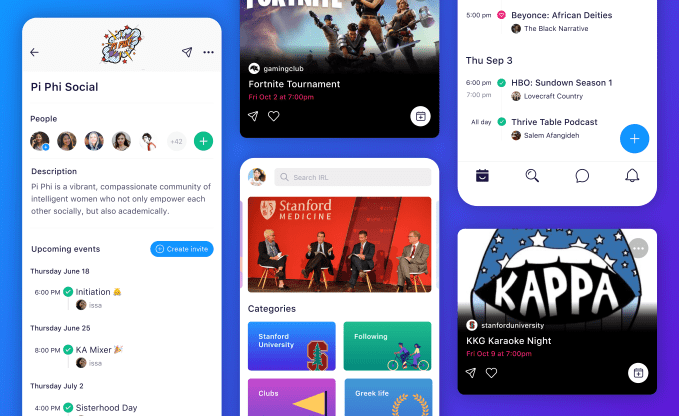
Image Credits: IRL
Today, IRL has 20 million users and 12 million who use the app monthly, which are not startling numbers in comparison to major social networks and their billions of users. But the numbers are representative of a steady approach that helped IRL grow 400% over the past 15 months, despite COVID’s impact to real-world events.
But as of recently, things are starting to change. In-person events are starting to return. California, the home state for San Francisco-based IRL, is today re-opening, for example. That opens up IRL to once again focus on connecting people not just online, but also “in real life,” as its name implies.
That could mean helping people better connect around events with not just their own friend group, as is often the case today, but helping them discover new groups in their local area or on campus. The company is even planning to use a portion of its fundraise to help fuel the new events economy by allocating a certain amount of money per city that will go toward helping people put on real-world events. The exact details are still being worked out, Shafi says, but says the idea is that IRL wants to help “bring culture back in cities that are opening up again.”
IRL also plans to expand its international footprint by finding ways to bring in non-U.S. users to its platform — possibly beginning with the events focused on watching the Olympics. (If the Games are not again delayed or canceled due to a COVID surge.)
Shafi says IRL hadn’t been planning to fundraise, but they decided to take the meetings when they were approached.
“The philosophy is not to raise when you have to, but to raise when it makes sense. And we were scaling like crazy to the point where our servers were melting. It made sense to take those discussions very seriously when they came to us,” he says.
The addition of SoftBank and Dragoneer brings some expertise in scaling large social networks to the IRL team. SoftBank’s other notable social networking investment is with TikTok owner’s Bytedance, while Dragoneer has backed Snap. IRL has already has a close relationship with TikTok as it’s worked with the video app to pull in interesting events for discovery. It more recently integrated with TikTok’s new “Login Kit,” too, allowing TikTok users to authenticate with IRL using their TikTok credentials.
Now, IRL plans to add an even deeper TikTok integration — something that caught SoftBank’s attention.
Shafi is cagey on the details, but says more will be announced in the “coming weeks.”
“But what I can say is that we’ve seen a ton of growth of TikTok users linking to IRL group chats and IRL events through their TikTok profiles as a way to communicate and go deeper in relationships,” he says. “If you think about it, right now Instagram has really great messaging…whereas TikTok is still developing that,” he hints.
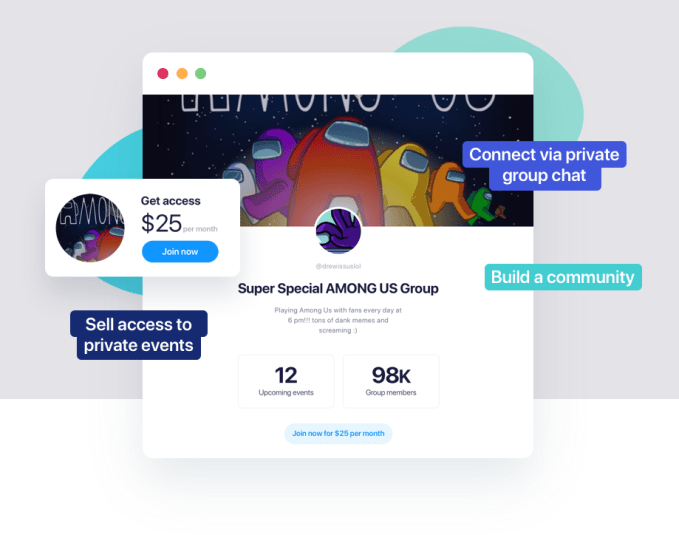
Image Credits: IRL
Beyond its value to growing social networks for the younger, Facebook-less generation, IRL is thinking about how to build a profitable business without ad revenue. On this front, it sees potential in helping people connect through paid events — although these wouldn’t have to be influencer-driven as on other platforms. In fact, when IRL recently piloted paid group chats, users were willing to pay for access to things like a calc homework help group, for example.
IRL also sees demand for tools that help groups and clubs collect membership dues and other fees, as well as for events that are too small for Ticketmaster or Eventbrite.
“Whether we succeed or fail will be based on our ability to execute on our opportunity,” says Shafi, adding that most social networks today are focused on media more so than helping users make connections. “What we’re building isn’t the media part of social, it’s the real human interaction part of social, because that hasn’t been paid attention to as much.”
“We’re building a messaging social network,” he continues, comparing it to the biggest messaging social network in the world, WeChat. “The big vision that we’re going for is building the WeChat of the West — a messaging super social network. And it starts with people organizing groups and doing things together,” he says.
With the additional funding, IRL will invest in product growth, international expansion and its Creator and Culture Fund, and will grow its now 25-person remotely distributed team to 100 by year-end.
“People are increasingly seeking more in-person social connections and are looking to share meaningful experiences together. As an innovative event-based social network, IRL sits at the intersection of group and event discovery, social calendaring, and group messaging, enabling people to do more together,” added Serena Dayal, director at SoftBank Investment Advisers, in a statement about its investment. “We are excited to partner with Abraham and the IRL team to support their ambition of helping everyone deepen their connections to friends and family.”
APPS
Best ASO Tips To Boost Your App Search In 2022

You need your application to be really effective in the overpopulated application market. Then, at that point, you will have to drive downloads to endure. So when it’s all said and done, you must account for yourself. Get your application the consideration it merits.
The uplifting news, however, is that customers love to download applications – last year, we downloaded in excess of 200 billion applications around the world, and that figure is set to increment to 258 billion every year by 2022 as cell phone reception increments.
Assuming you need to be seen and have your application downloaded by however many clients as could reasonably be expected, then, at that point, you should begin by taking a gander at the application store.
Underneath, we’ve assembled probably the best application store improvement methods to assist you with creating more downloads in 2021 and then some…
Start with Your Application Name
The odds are you as of now have an extraordinary name for your application, yet an appropriately advanced application is about significantly more than marking.
Assuming you need to amplify transparency and guarantee you’re showing up when clients look for applications like yours, you ought to remember the primary keywords for your application name or title, comparable to how you’d make a title label while improving a site page.
You could begin with your application name so it tends to be plainly recognized, thus it appears on the home screen of gadgets.
Then, at that point, you can add a scramble or vertical bar prior to adding a few pertinent watchwords to your speciality, or even put your application name in quotes as we did with FORE Business Golf Networking.
Urge Users to Leave Reviews
You could ask for reviews by clients through the means of your site, or through an in-application notice toward the finish of their meeting, yet make sure to restrict the number of pop-ups you execute with the goal that you don’t disturb or disappoint your clients, as this could urge them to erase your application.
We’d support all application engineers and entrepreneurs to react to criticism on their applications, as this can further develop client relations and resolve issues in an open arena.
Zero in on Your Application Depiction
Your application depiction is your principle assemblage of text your landing page content, in a manner of speaking. Utilize a site like KeywordTool.io to discover information on your picked catchphrases to expand your openness. As portrayals are shortened, ensure you remember the main data for the initial three lines of your depiction, and afterwards add things like social confirmation, emoticon, and suggestions to take action to build commitment and downloads.
Incorporate Appealings Screen Captures
Pictures and recordings won’t help your application rank, yet they will expand changes and assist clients with working out whether it’s an application they truly need.
There’s a little guide in empowering clients toward downloading your application if in any case, they’re not going to interface with it, or download and leave a negative survey when they understand it wasn’t what was promoted.
Assuming you need to ‘tart up’ your item page, then, at that point, you can add marking and extra text and data and designs to your recordings and screen capture, yet they ought not to diminish your item.
Pay for App Store or Play Store
As we have SEO and pay-per-click, you need to work one next to the other (one is a gradual methodology with long haul benefits – the other is a speedy success yet requires an endless spending plan), application store promotions can be utilized to get the message out with regards to your new programming and assist you with positioning at the highest point of query items pages – in front of your opposition and enormous names in the application world.
Keep in mind, you’ll need to focus on the right crowd and art an advertisement that will assist you with changing over and that since you’re paying for situations, that doesn’t mean clients will download or cooperate with your application.
Wrapping Up!
You can employ a group of App Store Optimization Services suppliers to benefit a scope of application store improvement administrations, including watchword advancement, resource enhancement, and restriction to guarantee your application is seen by individuals that matter.
We have long periods of involvement in creating and showcasing applications and have assisted different customers with expanding their downloads by infiltrating rewarding and regularly undiscovered business sectors.
Author:
Prachi Gupta likes to write information about Digital Marketing Trends that can help audience to grow their business.
APPS
WhatsApp will finally let users encrypt their chat backups in the cloud
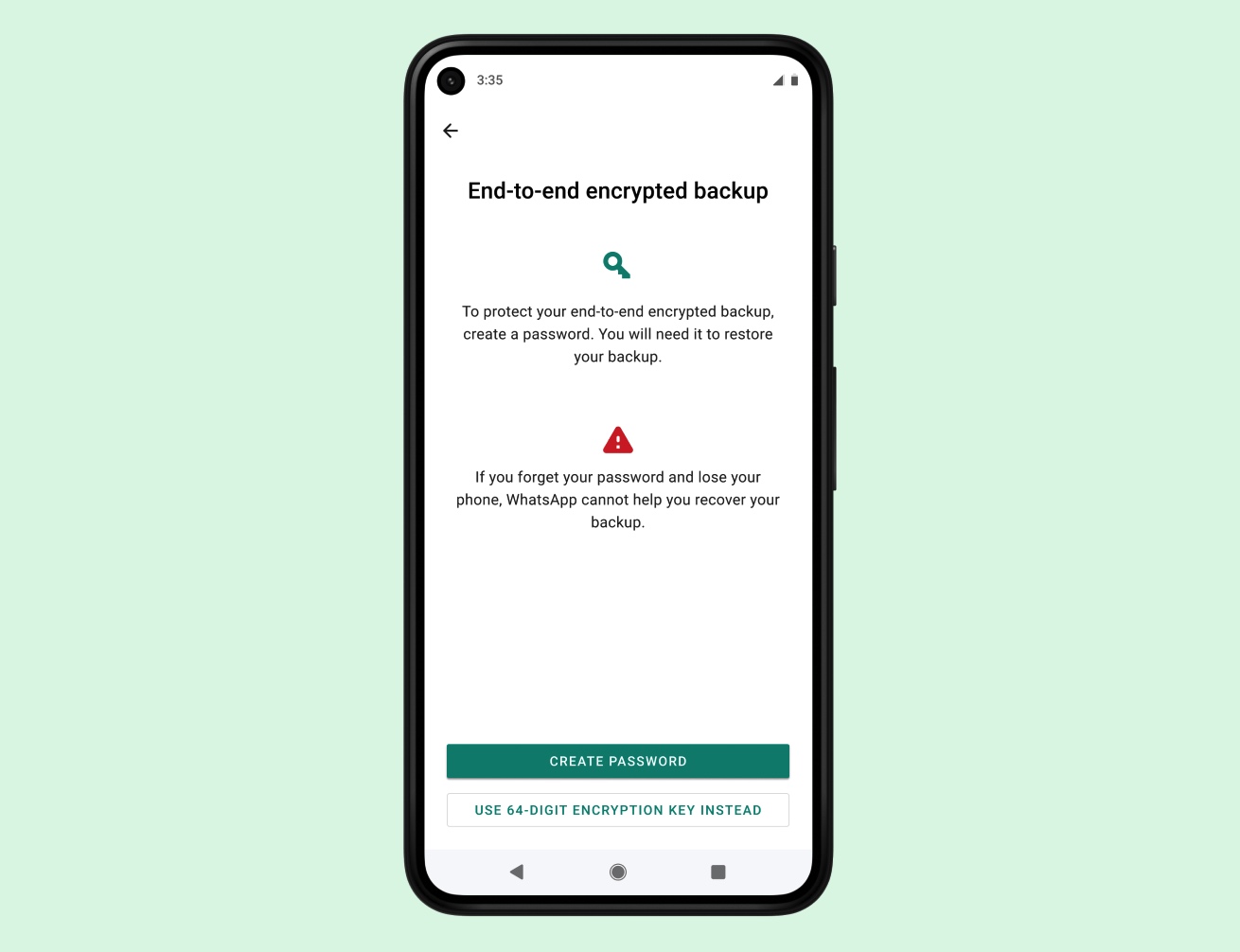
WhatsApp said on Friday it will give its two billion users the option to encrypt their chat backups to the cloud, taking a significant step to put a lid on one of the tricky ways private communication between individuals on the app can be compromised.
The Facebook-owned service has end-to-end encrypted chats between users for more than a decade. But users have had no option but to store their chat backup to their cloud — iCloud on iPhones and Google Drive on Android — in an unencrypted format.
Tapping these unencrypted WhatsApp chat backups on Google and Apple servers is one of the widely known ways law enforcement agencies across the globe have for years been able to access WhatsApp chats of suspect individuals.
Now WhatsApp says it is patching this weak link in the system.
“WhatsApp is the first global messaging service at this scale to offer end-to-end encrypted messaging and backups, and getting there was a really hard technical challenge that required an entirely new framework for key storage and cloud storage across operating systems,” said Facebook’s chief executive Mark Zuckerberg in a post announcing the new feature.
Store your own encryption keys
The company said it has devised a system to enable WhatsApp users on Android and iOS to lock their chat backups with encryption keys. WhatsApp says it will offer users two ways to encrypt their cloud backups, and the feature is optional.
In the “coming weeks,” users on WhatsApp will see an option to generate a 64-digit encryption key to lock their chat backups in the cloud. Users can store the encryption key offline or in a password manager of their choice, or they can create a password that backs up their encryption key in a cloud-based “backup key vault” that WhatsApp has developed. The cloud-stored encryption key can’t be used without the user’s password, which isn’t known by WhatsApp.
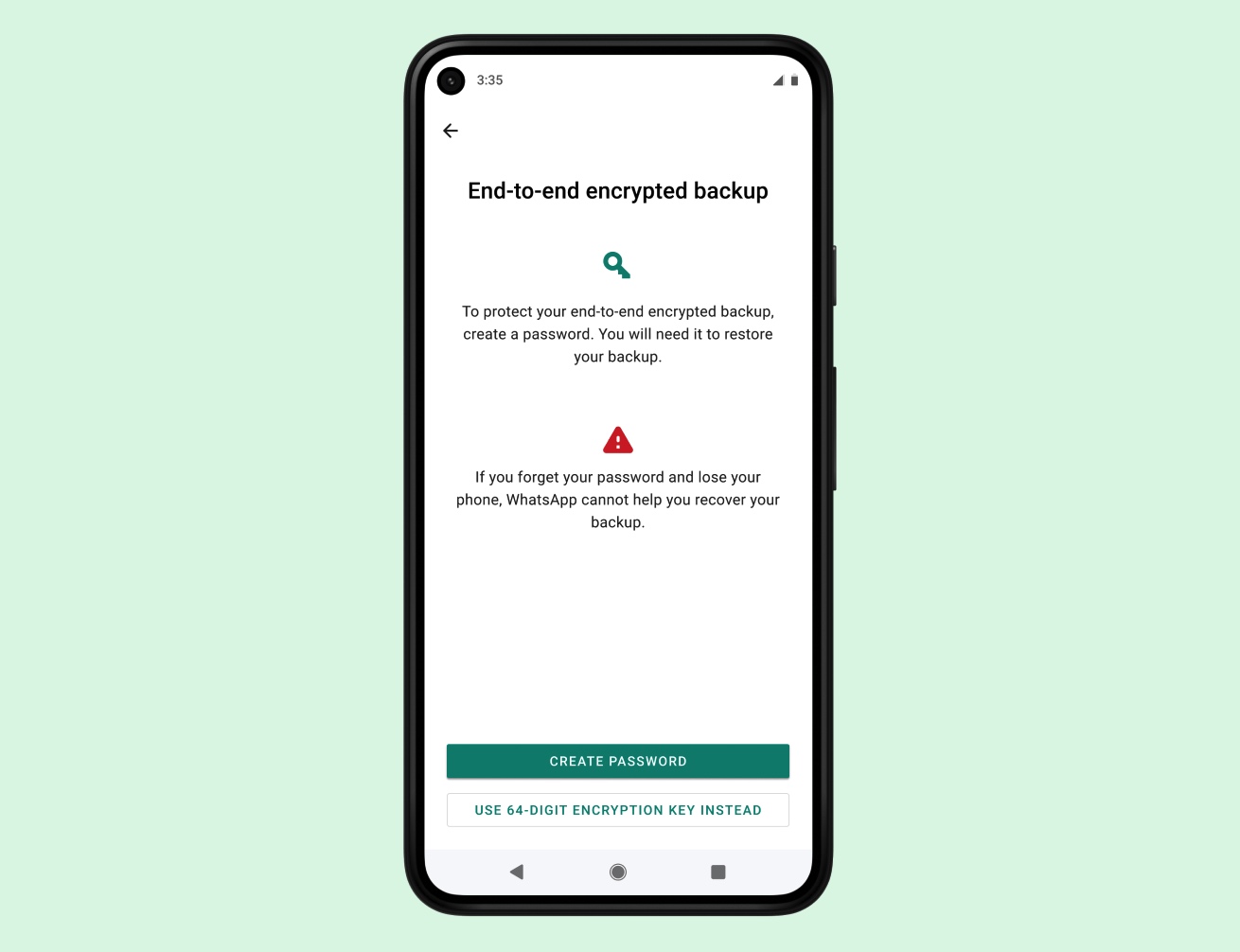
Image Credits: WhatsApp/supplied
“We know that some will prefer the 64-digit encryption key whereas others want something they can easily remember, so we will be including both options. Once a user sets their backup password, it is not known to us. They can reset it on their original device if they forget it,” WhatsApp said.
“For the 64-digit key, we will notify users multiple times when they sign up for end-to-end encrypted backups that if they lose their 64-digit key, we will not be able to restore their backup and that they should write it down. Before the setup is complete, we’ll ask users to affirm that they’ve saved their password or 64-digit encryption key.”
A WhatsApp spokesperson told TechCrunch that once an encrypted backup is created, previous copies of the backup will be deleted. “This will happen automatically and there is no action that a user will need to take,” the spokesperson added.
Potential regulatory pushback?
The move to introduce this added layer of privacy is significant and one that could have far-reaching implications.
End-to-end encryption remains a thorny topic of discussion as governments continue to lobby for backdoors. Apple was reportedly pressured to not add encryption to iCloud Backups after the FBI complained, and while Google has offered users the ability to encrypt their data stored in Google Drive, the company allegedly didn’t tell governments before it rolled out the feature.
When asked by TechCrunch whether WhatsApp, or its parent firm Facebook, had consulted with government bodies — or if it had received their support — during the development process of this feature, the company declined to discuss any such conversations.
“People’s messages are deeply personal and as we live more of our lives online, we believe companies should enhance the security they provide their users. By releasing this feature, we are providing our users with the option to add this additional layer of security for their backups if they’d like to, and we’re excited to give our users a meaningful advancement in the safety of their personal messages,” the company told TechCrunch.
WhatsApp also confirmed that it will be rolling out this optional feature in every market where its app is operational. It’s not uncommon for companies to withhold privacy features for legal and regulatory reasons. Apple’s upcoming encrypted browsing feature, for instance, won’t be made available to users in certain authoritarian regimes, such as China, Belarus, Egypt, Kazakhstan, Saudi Arabia, Turkmenistan, Uganda and the Philippines.
At any rate, Friday’s announcement comes days after ProPublica reported that private end-to-end encrypted conversations between two users can be read by human contractors when messages are reported by users.
“Making backups fully encrypted is really hard and it’s particularly hard to make it reliable and simple enough for people to use. No other messaging service at this scale has done this and provided this level of security for people’s messages,” Uzma Barlaskar, product lead for privacy at WhatsApp, told TechCrunch.
“We’ve been working on this problem for many years, and to build this, we had to develop an entirely new framework for key storage and cloud storage that can be used across the world’s largest operating systems and that took time.”
APPS
Dispo launches a test to gauge user interest in selling their photos as NFTs
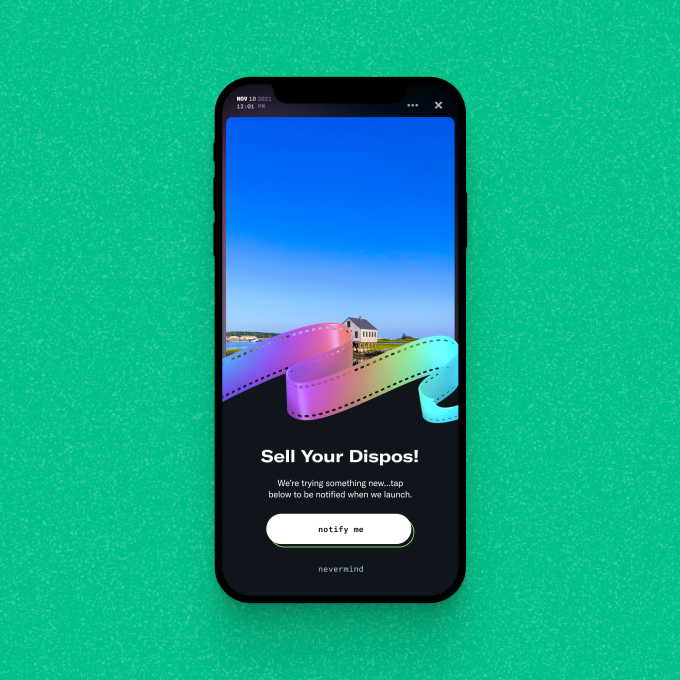
Dispo, the photo-sharing app that emulates disposable cameras, started rolling out a test yesterday that will record user interest in selling photos as NFTs. Some users will now see a sell button on their photos, and when they tap it, they can sign up to be notified when the ability to sell Dispo photos launches.
CEO and co-founder Daniel Liss told TechCrunch that Dispo is still deciding how it will incorporate NFT sales into the app, which is why the platform is piloting a test with its users. Dispo doesn’t know yet what blockchain it would use, if it would partner with an NFT marketplace or what cut of sales Dispo would take.
“I think it’s safe to say from the test that there will be an experience native to the Dispo app,” Liss said. “There are a number of ways it could look — there could be a native experience within Dispo that then connects through an API to another platform, and in turn, they’re our partner, but to the community, it would look native to the Dispo app.”
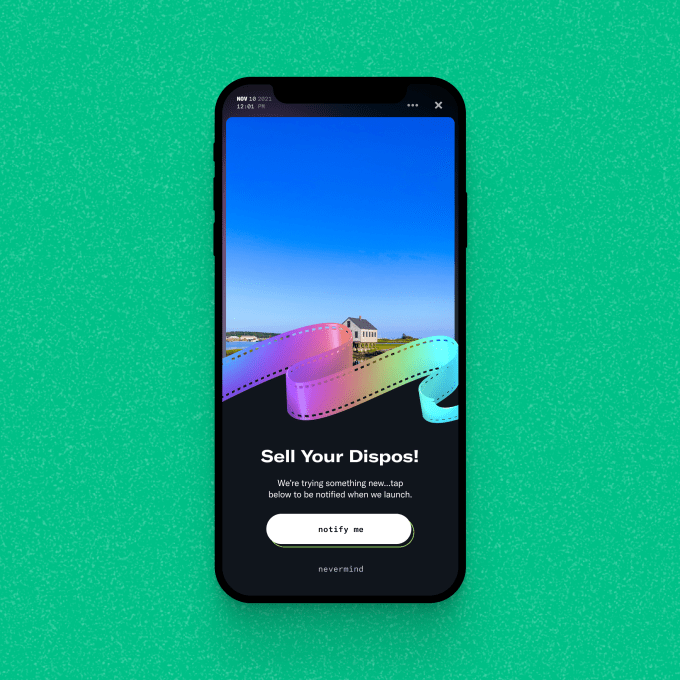
Image Credits: Dispo
This marks a new direction for the social media app, which seeks to redefine the photo-sharing experience by only letting users see the photos they took at 9 AM the next morning. From Dispo’s perspective, this gimmick helps users share more authentically, since you take one photo and then you’re done — the app isn’t conducive to taking dozens of selfies and posting the “best” image of yourself. But though it only launched in December 2019, Dispo has already faced both buzzy hype and devastating controversy.
Until about a year ago, the app was called David’s Disposables, named after co-founder and YouTuber David Dobrik. The app was downloaded over a million times in the first week after its release and hit No. 1 on the App Store charts. In March 2021, the app dropped its waitlist and relaunched with social network features, but just weeks later, Insider reported sexual assault allegations against a member of Vlog Squad, Dobrik’s YouTube prank ensemble. In response, Spark Capital severed ties with the company, leading to Dobrik’s departure. Other investors like Seven Seven Six and Unshackled Ventures, which contributed to the company’s $20 million Series A round, announced that they would donate any profits from their investments in Dispo to organizations working with survivors of sexual assault.
Liss told TechCrunch in June, when the company confirmed its Series A, that Dobrik’s role with the company was as a marketing partner — Liss has been CEO since the beginning. In light of the controversy, Liss said the app focused on improving the product itself and took a step back from promotion.
According to data from the app analytics firm SensorTower, Dispo has reached an estimated 4.7 million global installs to date since launch. Though the app saw the most downloads in January 2020, when it was installed over 1 million times, the app’s next best month came in March 2021, when it removed its waitlist — that month, about 616,000 people downloaded Dispo. Between March and the end of August, the app was downloaded around 1.4 million times, which is up 118% year over year compared to the same time frame in 2020 — but it should be expected that this year’s numbers would be higher, since last year, the app’s membership was exclusive.

Image Credits: Dispo
Now, with the announcement that Dispo is pursuing NFTs, Liss hopes that his company won’t just change how people post photos, but what the relationship will be between platforms and the content that users create.
“Why NFTs? The most powerful memories of our lives have value. And they have economic value, because we created them, and the past of social media fails to recognize that,” Liss told TechCrunch. “As a result, the only way that a creator with a big following is compensated is by selling directly to a brand, as opposed to profiting from the content itself.”
Adding NFT sales to the app offers Dispo a way to profit from a cut of user sales, but it stands to question how adding NFT sales could impact the community-focused feel of Dispo.
“I think there is tremendous curiosity and interest,” Liss said. “But these problems and questions are why we need more data.”
-

 PPC6 days ago
PPC6 days agoHow 6 SEO Experts Are Navigating Google Update Chaos
-

 SEARCHENGINES6 days ago
SEARCHENGINES6 days agoBing Search Testing Removing Cache Link From Search Results
-

 MARKETING6 days ago
MARKETING6 days ago60 Remote Work Stats to Know in 2024
-

 WORDPRESS5 days ago
WORDPRESS5 days ago10 WordPress Influencers to Follow in 2024 – WordPress.com News
-

 WORDPRESS6 days ago
WORDPRESS6 days ago8 Best WordPress Migration Services (Compared)
-

 MARKETING5 days ago
MARKETING5 days agoFeeling Stuck: What to Do When You Don’t Know What to Do
-

 SEARCHENGINES4 days ago
SEARCHENGINES4 days agoMore Google March 2024 Core Update Ranking Volatility
-

 SEO7 days ago
SEO7 days agoGoogle Explains How It Chooses Canonical Webpages













